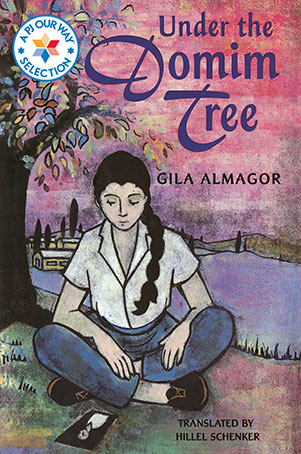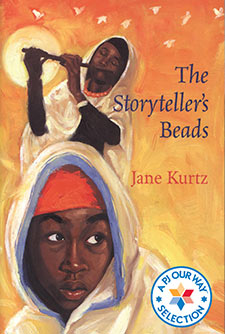Under the Domim Tree
Can you imagine living in a youth village, with no parents telling you what to do all the time? Aviya, Yola, and Mira do, but it's not as easy as you might think...This is a powerful and emotional story about three girls who live together after World War II. It is a story of hope and friendship and the power of forgiveness.
Average Rating
( hint: Login to leave a review! )
37 Reviews
Leave Review
What the Book is About
Jewish Content & Values
Positive Role Models
Content Advisory
Talk it Over!
More for You
What the Book is About
This is a poignant and beautifully written translation of a classic Israeli book about a group of children who live in a youth village in Israel in the 1950s. Aviya, the narrator, is a native Israeli, but most of the other children in the village are Holocaust survivors, each struggling with painful memories. In this gripping novel, Aviya finds young love and deals with her family's ghosts; Yola discovers that her father has survived the war; and Mira must confront a past that she does not even remember. As the plot develops, we are witness to the power of friendship, love, and respect as each child's wounds slowly heal.
Parents: Read this book along with your child. You won't regret it!
Jewish Content & Values
- Achdut (unity): Most of the children at Udim (the youth village) are orphaned and those who do have close family are unable to live at home for many different reasons. Even though they often disagree and personalities clash, there is a strong sense of community and friendship among the children
- Shoah (Holocaust): The shadow of the Shoah pervades the newly established state of Israel and every child survivor has his or her own story.
- Israeli culture: In Udim, the children live kibbutz style, rotating agricultural and communal responsibilities. They share everything: living space, meals, and even clothing; and they speak Hebrew as their common language.
Positive Role Models
- The staff at the youth village is fully invested in the holy work of protecting and embracing the children in their care. Ariel, the children’s counselor, provides the children with a warm and loving environment, always speaking to them in a respectful manner (almost as if they were adults) and allowing them their independence. When he discovers that Aviya has left the school without permission, he asks her quietly not do that again. He takes his responsibility seriously, including protecting Mira from unwanted visitors.
- The children of the youth village are sensitive to the needs of their friends and support each other through tough times. As Ayala (Aviya’s best friend) tells Mira when she is struggling to remember her past identity, “We all have our problems and each of us has her difficult moments and her little joys. So right now, it’s your problems that have center stage.”
- Wim, also known as Tuviah, is a true hero; as part of the Dutch underground, he saved seven Jewish children during the war. After the war, he immigrated to Israel (along with the children), joined the youth village as a gardener, and converted to Judaism. In the story, he travels to Holland to receive a medal of honor from Queen Juliana of Denmark.
Content Advisory
-
This book is written in the context of the Shoah, and addresses serious issues that may be too heavy for very sensitive readers; nevertheless, it is a beautiful book and highly recommended.
Although this book does not have graphic depictions of what the children suffered during the war, it’s easy to sense the severity of past trauma from the extent of the emotional and psychological issues that are described.
- Alex and Misha are two boys who survived together in the forest during the war by pretending to be wild animals. In one haunting scene, they gallop through the courtyard of the youth village late at night making wolf noises, as the rest of the children peer out their windows at them.
- Aviya’s mother has a mental illness and is unable to care for Aviya or tell Aviya about her father’s death. Aviya’s mother devotes her time to the poor and indigent, and even invites Avramel (a deaf and dumb, mentally disabled man who is reputed to have exposed himself to young girls) to her home. Aviya’s mother suddenly disappears from her apartment, and when Aviya locates her in a psychiatric hospital, she is in a dissociative state and does not respond.
- The entire youth village is filled with joy when it is discovered that Yola’s father has been located alive in Warsaw; however, before she can meet him, he dies from the shock.
- Mira was badly abused by the couple claiming to be her parents, and the girls at the dormitory beat her up in response to her cruel comments about Yola’s tragic story.
Talk it Over!
The children at Udim debate whether it’s wrong to play the music of Richard Strauss, an avid Nazi supporter and composer of classical music. Do you think art should be judged by the actions of the artist? Or should it speak for itself?
More for You
Gila Almagor, author of this book, is a famous Israeli film star. She acted in more than 40 Israeli films and received many awards, including the Israel Prize for Cinema. Under the Domim Tree and Summer of Aviya, her two autobiographical books, were both made into movies, with Almagor playing her own mother!
What the Book is About
What the Book is About
This is a poignant and beautifully written translation of a classic Israeli book about a group of children who live in a youth village in Israel in the 1950s. Aviya, the narrator, is a native Israeli, but most of the other children in the village are Holocaust survivors, each struggling with painful memories. In this gripping novel, Aviya finds young love and deals with her family's ghosts; Yola discovers that her father has survived the war; and Mira must confront a past that she does not even remember. As the plot develops, we are witness to the power of friendship, love, and respect as each child's wounds slowly heal.
Parents: Read this book along with your child. You won't regret it!
Jewish Content & Values
Jewish Content & Values
- Achdut (unity): Most of the children at Udim (the youth village) are orphaned and those who do have close family are unable to live at home for many different reasons. Even though they often disagree and personalities clash, there is a strong sense of community and friendship among the children
- Shoah (Holocaust): The shadow of the Shoah pervades the newly established state of Israel and every child survivor has his or her own story.
- Israeli culture: In Udim, the children live kibbutz style, rotating agricultural and communal responsibilities. They share everything: living space, meals, and even clothing; and they speak Hebrew as their common language.
Positive Role Models
Positive Role Models
- The staff at the youth village is fully invested in the holy work of protecting and embracing the children in their care. Ariel, the children’s counselor, provides the children with a warm and loving environment, always speaking to them in a respectful manner (almost as if they were adults) and allowing them their independence. When he discovers that Aviya has left the school without permission, he asks her quietly not do that again. He takes his responsibility seriously, including protecting Mira from unwanted visitors.
- The children of the youth village are sensitive to the needs of their friends and support each other through tough times. As Ayala (Aviya’s best friend) tells Mira when she is struggling to remember her past identity, “We all have our problems and each of us has her difficult moments and her little joys. So right now, it’s your problems that have center stage.”
- Wim, also known as Tuviah, is a true hero; as part of the Dutch underground, he saved seven Jewish children during the war. After the war, he immigrated to Israel (along with the children), joined the youth village as a gardener, and converted to Judaism. In the story, he travels to Holland to receive a medal of honor from Queen Juliana of Denmark.
Content Advisory
Content Advisory
-
This book is written in the context of the Shoah, and addresses serious issues that may be too heavy for very sensitive readers; nevertheless, it is a beautiful book and highly recommended.
Although this book does not have graphic depictions of what the children suffered during the war, it’s easy to sense the severity of past trauma from the extent of the emotional and psychological issues that are described.
- Alex and Misha are two boys who survived together in the forest during the war by pretending to be wild animals. In one haunting scene, they gallop through the courtyard of the youth village late at night making wolf noises, as the rest of the children peer out their windows at them.
- Aviya’s mother has a mental illness and is unable to care for Aviya or tell Aviya about her father’s death. Aviya’s mother devotes her time to the poor and indigent, and even invites Avramel (a deaf and dumb, mentally disabled man who is reputed to have exposed himself to young girls) to her home. Aviya’s mother suddenly disappears from her apartment, and when Aviya locates her in a psychiatric hospital, she is in a dissociative state and does not respond.
- The entire youth village is filled with joy when it is discovered that Yola’s father has been located alive in Warsaw; however, before she can meet him, he dies from the shock.
- Mira was badly abused by the couple claiming to be her parents, and the girls at the dormitory beat her up in response to her cruel comments about Yola’s tragic story.
Talk it Over!
Talk it Over!
The children at Udim debate whether it’s wrong to play the music of Richard Strauss, an avid Nazi supporter and composer of classical music. Do you think art should be judged by the actions of the artist? Or should it speak for itself?
More for You
More for You
Gila Almagor, author of this book, is a famous Israeli film star. She acted in more than 40 Israeli films and received many awards, including the Israel Prize for Cinema. Under the Domim Tree and Summer of Aviya, her two autobiographical books, were both made into movies, with Almagor playing her own mother!


